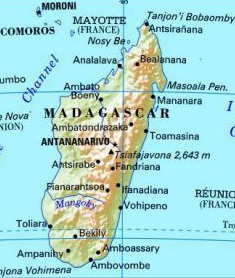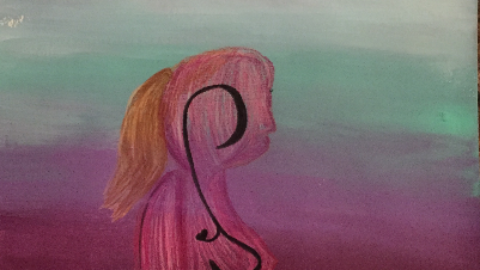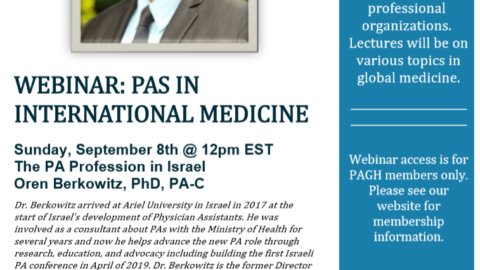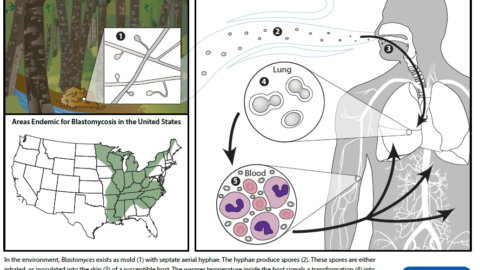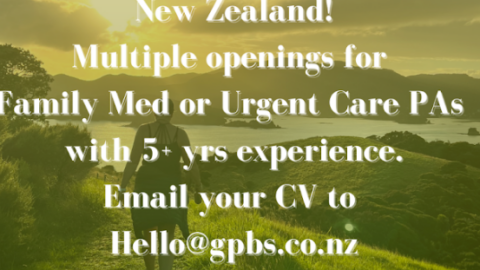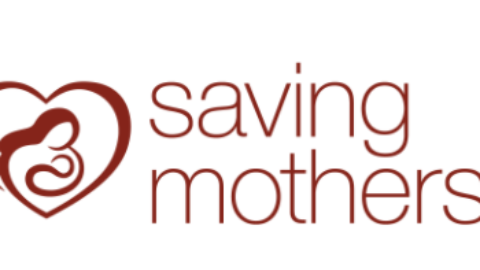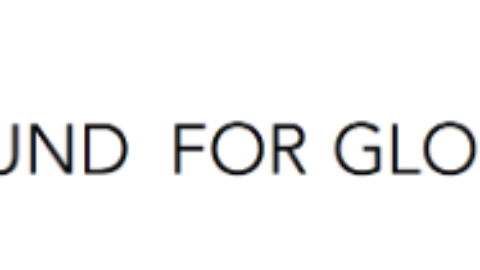Spotlight on International Physician Assistant Careers
Interview Conducted and Edited by Katie Jo Sloter, MPH, PA-S
This is a new series where PAGH will focus on Physician Assistants who are employed internationally. It is meant to inspire all of us, and give us an idea of how they got there.

Christopher Casey MS PA-C, MP, U.S. Embassy
Can you tell us a little bit about who you are?
My name is Chris. I am a 49 year old male, and I grew up in the UK. My educational background includes a Bachelors in Sports Science from the UK, a Masters in Exercise Science. I am also a licensed clinical Massage Therapist. I spent 10 years working in health and fitness, including Boeing Medical Programs in Seattle, Spine Rehabilitation and ultimately self–employed with a clinical practice in sports and clinical massage.
Graduated with MS in PA Studies in 2002 from Pacific University in Forest Grove, OR. Lived and practiced Family Medicine in Winthrop, WA (Rural North Cascades in Washington State) and Emergency Medicine at a level IV Critical Access hospital in Brewster, WA for 7 years. I spent one year working as part of the Trauma Team at Munson Medical Center in Traverse City, MI, before returning to ER full-time in Brewster, WA in 2010.
In 2011 I applied for US Department of State as a Medical Provider. In the meantime I spent 6 months working as a medical officer on a drill ship in the arctic during Shell’s 2012 drilling program (not as exciting as you might think, also was the FAA Weather Observer for helicopter operations and drank a lot of coffee). I finally accepted and joined State in January of 2013. Since then, we spent 2.5 years based at the US embassy in Tirana, Albania and currently posted to Embassy Antananarivo, Madagascar. We have another year and change left before we leave for the next post… wherever that may be.
Where are you currently based? Antananarivo, Madagascar
What organization do you work for? What department of medicine? I am currently a Foreign Service Medical Provider with the U.S. Department of State, Bureau of Medical Services.
How did you originally find out about the organization and get connected? One page ad in one of those free trade magazines.. maybe Clinician Reviews … back in PA school!
Can you describe a day in your life?
I am the only medical provider at the US Embassy in Antananarivo, running a 2 bed medical unit with a staff of 2-3 people.
Much like any other family practice we are open during the day and see patients as needed. Unlike the US, I can typically see patients same day and if something is odd, can often see them very quickly. Typical office work, follow up calls, checking labs (we can do many labs in house), routine medical issues, well-child checks, physical exams etc. Often there are ongoing projects with other departments for training or health issues to deal with (CPR, emergency first aid, trauma response). Updating the Ambassador on new medical issues in country or reporting back to DC as part of our surveillance system for diseases such as Ebola, flu and so forth. Managing the health unit inventory of medications or equipment, in-service training with staff. We perform driver physicals, OB exams. OBs go back to the US at 34 weeks.
I accompany the regional security staff to the shooting range and during vehicle emergency training. I also visit new medical providers and resources such as a hospitals. I visit with other embassy’s medical staff if there are issues we are all dealing with. I have been tasked with presenting the embassy at certain diplomatic functions, particularly when they are health related.
I might drop in and do a home visit or two on my way home after work depending on urgency. Evenings are mostly free although I am on-call 24 hours a day. Thus far, most people have been respectful of off-hours phone calls, though I hear this is not always the case at the bigger posts, and a big part of this I think is drawing good boundaries early in the tour as well as providing good availability during the other hours.
What can you tell us about working as a PA in your host country? How are PAs perceived? They have no idea and truthfully I don’t go there, too confusing and interferes with me accessing the appropriate care for our patients. Generally being the medical provider for the U.S. Embassy is enough to open the door. To be clear though, I have never misled about my professional credentials, I just don’t draw attention to the fact that I am not an MD unless specifically asked.
What can you tell us about your host country? Ah, Madagascar… 5th or 6th poorest nation in the world… the majority live on less than $2 a day. Crumbling ex-French Colonial infrastructure, struggling democracy, corruption at all levels, subject to frequent government changes between the same ruling classes… though we hope and push for a democratic transition in the next election. This island is the size of California and Oregon put together. The roads are mostly dire, some places impossible to get to during the rainy season. Frequent cyclones make life even harder.
Few people speak English, so it requires some grasp of French language in the cities and in the rural communities the only language is Malagasy.
Disease is common, many children exhibit severe stunting due to malnutrition, we (in country, not in our population) have many cases of plague every year, polio is still here, rabies, malaria, dengue and chikungunya as well as tropical insects that bite, burrow, and spread disease and infection in a flash. There is still a widespread belief in faith healers here. Western medicine is sought only as a last resort.
What are some challenges you have encountered working as a PA in an international location?
Since I am the only provider here for this community and the local resources are mostly questionable, I am on call 24/7, 365 days a year. Occasionally our health unit nurse cover the call phone, but if I am in-country I am still ‘it’. I have taken urgent care calls while on vacation. Most memorably discussing wound management with a patient on my cell phone while bumping along in a safari vehicle in the middle of the Ngorogoro Crater in Tanzania, surrounded by lions and zebras.
The adage that ‘common things happen commonly’, still holds true. By far the most frequent things we see are the same as those back home ... URI’s GI issues, skin problems or musculoskeletal injuries. The biggest challenge I think is how to respond to personnel who are injured a long way from the capitol- perhaps several days away by car, in an area where no medevac plane can land. How do we get them out? Where do they go for stabilization? How do we get an air ambulance to them? So often we are playing a game of contingency planning.
What are some differences working as a PA in your location versus in the United States?
Much of what we do is contingency planning for emergency operation. There is no 911, no ambulance service, no decent ICU, no emergency cardiac or neurosurgery here. Surgical options are extremely limited and anesthesia a moving target. Radiology studies (MRI, CT, Ultrasound) are mostly available only in the capitol (there is one MRI scanner in the whole country by the way) but they are old machines, often not working or the tech is away or the radiologist won’t read for a couple of days.
My only option in an emergency might be to stabilize myself and manage a critical-care air ambulance, which once activated might be twelve to fourteen hours away from landing here. Having a grasp on critical care skills and management is a huge plus for your mental wellbeing. We spend a lot of time training for mass casualty events, big trauma and explosion scenarios. We train continuously with security staff, medical response teams, Marine Security Guards, and personal security details for response and efficient equipment use. Certainly we don’t do this back home.
We don’t really deal with medical insurance, which is a weight off my back, and in reality we are offering almost concierge medicine to this community. I get to spend as much time as I want with my patients and they are a ‘captive’ community if we need to see them again in follow-up! My patient loads are typically low, allowing me to focus on other issues, and for the most part acuity is low… though when it happens it can get ugly quickly, so you have to constantly try to stay one step ahead and if in doubt get them out!
On the downside, it is difficult to stay sharp medically. In my old ER I would see maybe 25-30 patients in shift, often performing procedures or minor surgery, here maybe I deal with 5-10 patients a day. Also, we have an increasing number of pediatric patients and early OB patients here, which is fine as long as they are healthy. However, everyone gets pretty jumpy when things are not right.
What population do you generally work with?
My position is solely to provide all levels of medical care of the diplomatic community of the US Embassy in Antananarivo, Madagascar, Port Louis Mauritius and in Moroni, Comoros. Mainly I am based in Madagascar. This includes diplomats and families (there are a lot of children here 45 currently and often 1 or 2 OB cases going on) for all aspects of care, family practice through emergent aeromedical evacuation management. We also take care of visiting employees or high level visitors such as congress or foreign VIP’s. We don’t directly care for our local hire employees unless it is an occupational type situation.
Since I am also responsible for overseeing medical coverage at the U.S. embassy in Port Louis, Mauritius where the main provider is a local RN and in the Island of Comoros, where the medical care makes Madagascar look advanced. This require periodic trips to visit and review plans and patients, which keeps life interesting.
How could someone interested in global health work achieve what you have achieved? Minimum of 5 years of broad primary care along with some ER type work and you could be qualified to apply.
Do you have any recommendations or tips for future global health PA's in general? How about for your specific position?
Strong desire for a practice where you will have an almost unheard of scope of practice for a Physician Assistant- your supervising physician maybe thousands of miles away and you will see them once a year (though there are always people around to make a call to for advice).
Sense of adventure required and the ability to withhold a sense of disbelief helpful. This job does not allow much of an interface with relief type work in the local population- if that is what you want, you need to work with an NGO such as UNICEF among others. You will not be practicing high level diplomacy. While you can make some opportunities and will be given some others, your task is to ‘grease the wheels of diplomacy’ by allowing the others to do their work.
If someone was interested in your organization, what contact information would you have available? Would you be willing to be contacted? (include contacts of organization, your contacts).
I would be happy to be contacted and could forward information to those that would need it. Interested applicants can follow the Department of State Human Resources website for information about hiring openings, which come up periodically.
Anything else you would like to share, or feel that it would be beneficial for us to know?
My family has had some amazing opportunities to travel and see different cultures and places over the last 5 years. We have had the chance to bike, sail, tour around the Balkans, ride our bikes across Madagascar, and fly kites with local kids in the surf on the remote beaches on the Mozambique channel. We have had experiences that simply visiting a place as a tourist, we would never have had. In addition, our children have experienced other languages (somewhat fluent in French now), learned and that for many, it is a daily struggle.
As a Physician Assistant, this has allowed me to practice medicine in about as autonomous a manner as I could imagine. I might want a bit more variety of medicine, but generally this is a pretty varied job and pretty satisfying.
Thank you to Chris Casey for sharing his story with PAGH! Please feel free to contact him at [email protected] for further questions regarding international work as a Medical Provider for the State Department.
This interview was conducted by Katie Sloter, second year PA student at Red Rocks Community College in Arvada, Colorado. If you have an international position you are willing to be high-lighted, please contact [email protected] to share your story with Physician Assistants for Global Health.

